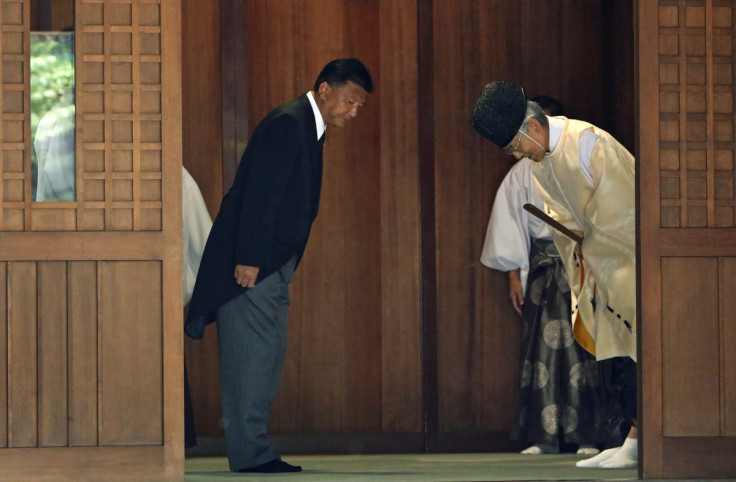Japan's Lawmakers Visit WW II Shrine Angering China

About 150 Japanese lawmakers and a cabinet minister paid tributes at the Yasukuni war shrine, which honours the country's soldiers, including those convicted of serious war crimes, who died in WW II.
Internal Affairs and Communications Minister Yoshitaka Shindo was among the visitors to the shrine. Prime Minister Shinzo Abe himself did not show up at the site, but dedicated a tree as a mark of respect.
The visit, angering China, comes just a few days before US President Barack Obama's visit to Asia.
A museum near the shrine, which depicts Japan's WWII extreme nationalism in a positive light, has upset China which suffered greatly under Japanese colonisation during the era.
The controversial visit was hardly a one-time event, as the conservative lawmakers in the country are generally known to pay regular homage at the site during spring and autumn festivals.
The US has always urged east Asian countries to refrain from provocations and to work towards amiable diplomatic relations.
Last year, when Abe visited the shrine, the US said that it was "disappointed" over the worsening ties between Japan and its neighbours.
Abe's administration seemingly has not restricted his cabinet or high-profile members of his government from paying tribute to the war memorial shrine.
China says that the frequent visits to the place by Japanese leaders only serve as painful reminders of Japanese oppression during world war.
"The Japanese leader's presentation of an offering to the Yasukuni shrine and visits by Japanese cabinet ministers to the Yasukuni shrine reflect the erroneous attitude toward history adopted by Japan's incumbent cabinet," Qin Gang, Chinese foreign ministry spokesman, said at a press conference.
"I also want to point out that the issue of the Yasukuni shrine is something that always jeopardises the relationship between Japan and its Asian neighbours."
Ship seizure
Meanwhile, Japan has lodged a protest against China over the seizure of a ship owned by Japanese shipping company Mitsui OSK Lines over unpaid compensation for a pre-WW II incident.
In 1936, Daido Shipping, Mitsui's predecessor, had hired two ships on a one-year contract from the Chinese firm Zhongwei Shipping, which were expropriated by the Japanese Navy but were sunk during the world war.
A descendant of Zhongwei founder filed a case against Mitsu seeking compensation, which a Shanghai court upheld. The court also rejected an appeal moved by the Japanese firm.
Japan maintains that the seizure of the ship over a lawsuit relating to events so far back in history in uncommon circumstances was "extremely regrettable".
Yoshihide Suga, a Japanese government spokesman, told reporters that the Chinese court's ruling will be bad for business in China.
© Copyright IBTimes 2025. All rights reserved.



















